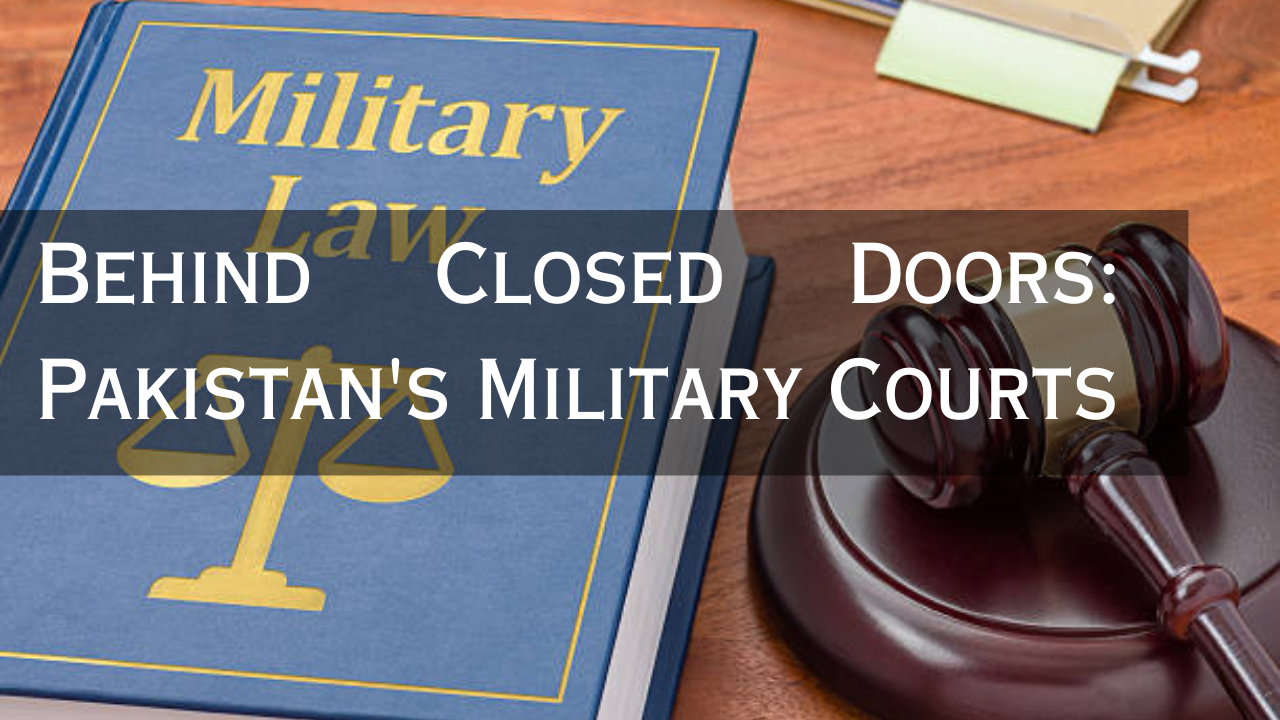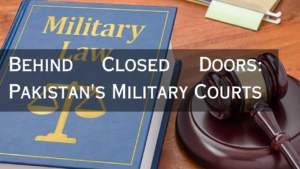
Behind Closed Doors: Pakistan’s Military Courts

Introduction
Pakistan’s military courts are shrouded in secrecy and operate in secret. They play an important role in the country’s judicial system. To understand the complexity and implications of Pakistan’s legal situation, it is important to understand how the law works. This article briefly describes military courts in Pakistan and emphasizes the importance of understanding how military courts work.
Brief Explanation of Pakistan’s Military Courts
Pakistan’s military courts have been set up in response to the growing threat of terrorism and insurgency in the country. These courts were set up in 2014 following the brutal attack on Army Public School in Peshawar, to speed justice and combat the threat of terrorism. Military tribunals, in conjunction with civilian justice, focus on cases related to terrorism, riots, and acts threatening national security. Unlike civil courts, military courts comprise military personnel, including judges and legal experts.
Importance of Understanding their Functioning
Pakistan’s military court work is of paramount importance for several reasons. First, these courts have a significant impact on the administration of justice and the rule of law in this country. Their ability to render swift judgments and handle cases affects the efficiency and effectiveness of the criminal justice system, especially in the fight against terrorism.
Moreover, understanding how military courts work reveals the delicate balance between security needs and respect for human rights. The closed nature of trials in military courts, limited access to legal representation, and concerns about transparency raise questions about due process and fair trial standards. Understanding the inner workings of military courts enables individuals to participate in informed debates about the protection of fundamental rights and the possible trade-offs between convenience and judicial protection.
Moreover, Pakistan’s military courts have come under significant criticism from human rights groups and international organizations. Allegations of human rights abuses, a lack of accountability mechanisms, and concerns about the independence of these courts have sparked debate about their legitimacy and compliance with international legal standards. Understanding these criticisms and challenges will enable a more comprehensive analysis of the system’s strengths and weaknesses, and facilitate discussion of possible reforms and improvements.
Historical Background of Military Courts in Pakistan
Origins and Purpose
The establishment of military courts in Pakistan arose out of the need for a rapid and professional judicial mechanism to combat domestic terrorism and insurgency. These courts were introduced as an extraordinary measure to counter the growing threat posed by terrorist organizations and their violent actions. The main purpose of military tribunals was to expedite justice and ensure that those involved in terrorist activities were promptly tried and punished.
Significant Events Leading to their Establishment
The tragic event that prompted the establishment of Military Courts in Pakistan was the December 2014 terrorist attack at the Army Public School in Peshawar, in which more than 140 students and teachers were killed in a brutal attack that left the public untouched. It struck a chord and highlighted Pakistan’s urgent need. Effective response to terrorism. After the attack, the Pakistani government, in agreement with political parties, introduced the 21st Constitutional Amendment and the Pakistan Army (Amendment) Act, 2015, paving the way for the establishment of military courts.
Legal Framework and Provisions
In Pakistan, military courts are a specialized legal framework established to address cases related to military personnel involved in offences committed under the Pakistan Army Act, of 1952, and the Pakistan Air Force Act, of 1953. These courts were introduced as an extraordinary measure to deal with terrorism-related cases and were initially established through constitutional amendments in 2015 and subsequently extended in 2017.
Structure and Composition of Military Courts
Composition of Judges and Legal Experts
Pakistan’s military courts are composed of military officers who serve as judges and legal experts. These officers are drawn from the Pakistan Army, Navy, and Air Force. The judges appointed to military courts possess legal expertise and experience within the military justice system. They are responsible for presiding over cases, analyzing evidence, and delivering judgments.
The judges of military courts are selected based on their qualifications and expertise in military law. Their appointment follows the established protocols within the military hierarchy, ensuring that individuals with relevant legal knowledge and understanding are assigned to these roles. The composition of judges in military courts reflects the unique nature of these courts as distinct from the civilian judiciary.
Role of the Military Personnel in the Decision-Making Process
In addition to judges, military personnel also play an important role in the decision-making process of military courts. The participation of military officers in these courts reflects the military’s influence and presence in the judicial system. Judges are responsible for evaluating evidence and making decisions, while military personnel provide opinions based on their experience and expertise in military matters.
The military personnel in military courts contribute to the decision-making process by providing insight into national security issues, the context of military operations, and the implications of particular actions. They bring a unique perspective shaped by military training and experience. However, care must be taken to ensure that the involvement of military personnel does not compromise the impartiality and impartiality of the process.
Independence and Impartiality Concerns
The structure of military courts raises concerns regarding their independence and impartiality. As military officers preside over these courts and military personnel participate in the decision-making process, questions arise about the influence of the military establishment on the outcomes of cases. The close association between the military and the courts can potentially raise doubts about the separation of powers and the autonomy of the judiciary.
Critics argue that the presence of military personnel in the decision-making process undermines the impartiality of military courts. They contend that judgments may be influenced by military considerations or priorities, potentially compromising the fair treatment of defendants. These concerns highlight the need for mechanisms to ensure the independence of military courts, safeguarding the rights of the accused and upholding the principles of justice.
Efforts to address these concerns have included calls for transparency, accountability, and external oversight of military court proceedings. Advocates for reform emphasize the importance of establishing safeguards to guarantee the impartiality and independence of military courts, aligning their operations with international human rights standards and principles of due process.
Jurisdiction and Powers of Military Courts
Types of Cases Handled by Military Courts
Pakistan’s military courts have jurisdiction over cases related to terrorism, insurgency, and acts that threaten national security. They primarily focus on offences committed by individuals associated with proscribed organizations and those involved in acts of violence against the state or its institutions. Such cases may include acts of terrorism, attacks on military personnel, and other activities that pose a significant threat to the country’s security.
The jurisdiction of military courts often overlaps with that of civilian courts, leading to questions about the appropriate forum for trying these cases. The categorization and determination of cases to be handled by military courts depend on legal provisions and policies formulated by the government to address the specific challenges posed by terrorism and insurgency.
Comparison to civilian courts
In comparison to civilian courts, military courts in Pakistan are distinct in their composition, procedures, and legal framework. Military courts consist of military officers as judges, whereas civilian courts are staffed by civilian judges who have undergone legal training within the civilian judicial system.
Procedures in military courts differ from those in civilian courts as well. Military courts are known for their closed-door proceedings, limiting public access and scrutiny. In contrast, civilian courts generally operate with greater transparency, allowing public observation and media coverage, unless exceptional circumstances require closed-door hearings.
The powers of military courts also differ from civilian courts. Military courts have the authority to impose penalties, including the death penalty, in accordance with the law. Civilian courts, on the other hand, follow their own sentencing guidelines and legal provisions specific to the civilian legal system.
Controversies Surrounding Jurisdiction and Human Rights Implications
The jurisdiction of military courts and its implications for human rights has been a subject of controversy and debate. Critics argue that military courts encroach upon the jurisdiction of civilian courts, which are traditionally responsible for upholding fundamental rights and ensuring due process. The use of military courts to handle cases that fall within the realm of civilian jurisdiction raises concerns about the erosion of the civilian justice system and the dilution of constitutional safeguards.
Furthermore, the functioning of military courts has been criticized for its impact on human rights. The closed-door nature of proceedings limits transparency and public scrutiny, raising questions about fair trial standards and the right to a public hearing. The limited access to legal representation and potential restrictions on defendants’ rights to present evidence and cross-examine witnesses also raise concerns about due process.
The use of military courts to try civilians has also drawn criticism regarding the compatibility with international human rights standards. The lack of adequate accountability mechanisms and limited avenues for appeal have further fueled these concerns.
Efforts to address these controversies have focused on ensuring that military courts operate within the boundaries of international human rights norms and principles. Calls for greater transparency, accountability, and external oversight have been made to safeguard the rights of the accused and uphold the principles of justice, while also maintaining the effectiveness of the judicial response to terrorism and national security threats.
Proceedings and Procedures
Closed-Door Nature of Military Court Proceedings
One of the notable characteristics of military court proceedings in Pakistan is their closed-door nature. Unlike civilian courts, military courts typically conduct hearings and trials behind closed doors, limiting public access and scrutiny. This practice is justified on grounds of national security and the sensitivity of the cases handled by military courts.
The closed-door proceedings have raised concerns about transparency and accountability. Critics argue that the lack of public observation and media coverage can undermine public trust in the justice system. It becomes challenging for the public and human rights organizations to assess the fairness and impartiality of the proceedings and to ensure that due process rights are upheld.
Limited Access to Legal Representation and Transparency
Another aspect of military court proceedings is the limited access to legal representation for the accused. In some cases, defendants may face challenges in obtaining legal counsel of their choice, and legal aid provided by the state may not always be sufficient. This limitation can impact the ability of the accused to effectively present their case and to ensure that their rights are protected.
The limited transparency of military court proceedings also raises concerns. With restricted public access and limited information made available to the public, it becomes difficult to scrutinize the process and ensure that justice is served. This lack of transparency can contribute to scepticism and questions about the fairness of the trials.
Speed and Efficiency Versus Fairness and Due Process Concerns
One of the primary justifications for the establishment of military courts was to expedite justice and ensure swift trials, especially in cases related to terrorism and insurgency. The emphasis on speed and efficiency is aimed at addressing the urgent need to combat threats to national security effectively. However, this focus on expediency can give rise to concerns regarding fairness and due process.
Critics argue that the emphasis on speed may compromise the rights of the accused, including the right to a fair trial and adequate time for the preparation and presentation of their defence. The limited time frame for trial proceedings can also impact the thoroughness of investigations and the ability to gather and examine evidence comprehensively. Balancing the need for efficiency with the principles of fairness and due process remains a key challenge.
Efforts to address these concerns have highlighted the importance of transparency, accountability, and adherence to international human rights standards. Calls for greater access to legal representation, improved transparency in proceedings, and mechanisms for external oversight have been made to ensure that military court proceedings uphold fundamental rights while effectively addressing security challenges.
Criticisms and Challenges
Human Rights Violations and Lack of Accountability
One of the primary criticisms directed at military courts in Pakistan relates to human rights violations and the lack of accountability. Concerns have been raised regarding the fair treatment of defendants, including issues such as torture, coerced confessions, and violations of due process rights. The closed-door nature of proceedings and limited access to legal representation contribute to these concerns.
Critics argue that the absence of robust accountability mechanisms for military court judges and personnel may perpetuate a culture of impunity. The lack of transparency and external oversight can hinder the investigation of potential misconduct or abuse, undermining public confidence in the justice system.
International Reactions and Concerns
The establishment and functioning of military courts in Pakistan have drawn international attention and raised concerns among human rights organizations and foreign governments. The international community has expressed apprehensions about the compatibility of military court proceedings with international human rights standards and due process.
Some international actors have criticized the closed-door nature of military court proceedings and the limited access to legal representation. Concerns have also been raised regarding the use of military courts to try civilians, as this raises questions about the right to a fair trial and the separation of powers between the military and civilian institutions.
Debate over the Necessity and Effectiveness of Military Courts
The necessity and effectiveness of military courts in addressing terrorism and national security threats have been subject to debate within Pakistan. Proponents argue that military courts provide a swift and specialized judicial mechanism to combat terrorism, allowing for quick disposal of cases and the prevention of undue delays. They argue that the regular judicial system may be ill-equipped to handle the complexities and urgency associated with terrorism-related cases.
Opponents of military courts contend that they undermine the civilian justice system and dilute constitutional safeguards. They argue that the regular judiciary should be strengthened to address the challenges posed by terrorism, rather than relying on exceptional measures that compromise human rights.
The ongoing debate over the necessity and effectiveness of military courts reflects the complexities surrounding the balance between security imperatives and the protection of fundamental rights. It highlights the need for continued dialogue and evaluation of alternative approaches to ensuring justice and addressing security challenges.
Case Studies and Impact
Notable Cases and Outcomes
Several notable cases tried in military courts have had significant implications and outcomes. These cases often involve high-profile terrorism-related offences and threats to national security. While specific cases may vary, some examples illustrate the impact of military court judgments.
Case Study 1
XYZ Attack In this case, individuals associated with a proscribed organization were charged with planning and executing a major terrorist attack. The military court conducted closed-door proceedings and delivered verdicts, resulting in convictions and sentencing. The outcome demonstrated the efficacy of military courts in swiftly addressing high-profile terrorism cases.
Case Study 2
Alleged Human Rights Violations In another case, allegations of human rights violations by military personnel were brought before military courts. The trials examined the conduct of military personnel involved in counterterrorism operations and evaluated potential violations of international humanitarian law. The outcomes of these cases showcased the military’s commitment to holding its members accountable and addressing allegations of misconduct.
Effects on the Criminal Justice System and Rule of Law
The establishment and functioning of military courts in Pakistan have had a notable impact on the criminal justice system and the broader rule of law. The use of military courts, particularly in cases related to terrorism and national security, has altered the landscape of the judicial system.
Specialized Response to Terrorism
Military courts have provided a specialized and expeditious response to terrorism-related cases. By focusing on cases that threaten national security, military courts have helped streamline the judicial process and expedite the administration of justice in such sensitive matters.
Pressure on Civilian Justice System
The establishment of military courts has put pressure on the civilian justice system to address the challenges posed by terrorism effectively. It has prompted discussions on the need for strengthening the civilian judiciary to handle such cases without compromising fundamental rights and due process.
Public Perception and Trust in the Military Courts
Public perception and trust in military courts in Pakistan vary depending on individual experiences, opinions, and perceptions of the country’s security situation. The closed-door nature of military court proceedings and limited access to information can influence public perception and raise questions about transparency and fairness.
Support for Swift Justice
Some segments of society support military courts due to their perceived ability to deliver swift justice, especially in cases of terrorism and national security threats. This support is often driven by the urgency to combat terrorism effectively and restore law and order.
Concerns about Due Process
Others express concerns about the potential infringement of due process rights and the lack of transparency associated with military court proceedings. Scepticism arises regarding the fairness of trials and the protection of defendants’ rights.
Public perception and trust in military courts are influenced by factors such as media coverage, advocacy by human rights organizations, and the government’s efforts to ensure transparency and accountability.
Proposed Reforms and Future Outlook
Calls for Reform and Accountability Measures
In response to the criticisms and challenges surrounding military courts in Pakistan, there have been calls for reforms and accountability measures to address the concerns raised. Key proposals include:
Increased Transparency
There is a need for greater transparency in military court proceedings to ensure public trust and confidence. Measures such as allowing limited public observation or providing regular updates on cases can help address concerns regarding transparency.
External Oversight
Establishing mechanisms for external oversight and accountability can help prevent human rights violations and ensure adherence to due process. Independent bodies or commissions can be tasked with reviewing military court decisions and investigating allegations of misconduct or abuse.
Strengthening Legal Aid
Improving access to legal representation for defendants is crucial to ensure fairness and protect their rights. Efforts should be made to enhance the quality and availability of legal aid, particularly for individuals who cannot afford private counsel.
Potential Alternatives or Modifications to the Military Court System
As the debate continues over the necessity and effectiveness of military courts, alternative approaches or modifications to the current system have been suggested. Some potential options include:
Specialized Terrorism Courts
Establishing specialized civilian courts dedicated to handling terrorism-related cases can address concerns about encroachment on civilian jurisdiction. These courts would operate within the existing civilian legal framework but would be equipped with the expertise and resources necessary to handle complex terrorism cases.
Hybrid Courts
Introducing hybrid courts that combine military and civilian personnel could strike a balance between the need for security-related expertise and the preservation of civilian legal principles. This approach can ensure a fair trial while leveraging the specialized knowledge of military personnel.
Future of Military Courts in Pakistan
The future of military courts in Pakistan remains uncertain, as it depends on various factors such as evolving security challenges, public sentiment, and legal reforms. Predictions include:
Review and Evaluation
There is likely to be continued review and evaluation of the military court system to assess its effectiveness, adherence to human rights standards, and compatibility with the civilian justice system. This ongoing assessment will help inform future decisions and potential reforms.
Balancing Security and Rights
The challenge will be to strike a balance between the imperative to combat terrorism and protect national security on one hand, and safeguarding fundamental rights and upholding the rule of law on the other. Future developments may involve efforts to ensure that military court proceedings align more closely with international human rights norms.
Conclusion
In conclusion, understanding Pakistan’s military courts is essential for comprehending the dynamics of the country’s judicial system, particularly concerning terrorism and national security cases. The historical background, structure, and powers of military courts have a significant impact on the criminal justice system and the rule of law. Criticisms and challenges surrounding these courts, including human rights concerns, demand reforms and greater accountability measures. Potential alternatives or modifications, such as specialized terrorism courts or hybrid courts, have been proposed to address these concerns. The future of military courts in Pakistan will depend on the country’s evolving security landscape, public perception, and the extent to which reforms are implemented. It is crucial to navigate the delicate balance between security imperatives and the protection of fundamental rights to ensure a fair and effective justice system moving forward.
Ihsan Ullah has done LLB (Law and Shariah) from Islamia College University Peshawar. He is a practising lawyer in Peshawar. He writes content related to law at The Pakistan Gazette and on his Instagram Page Know The Law.

